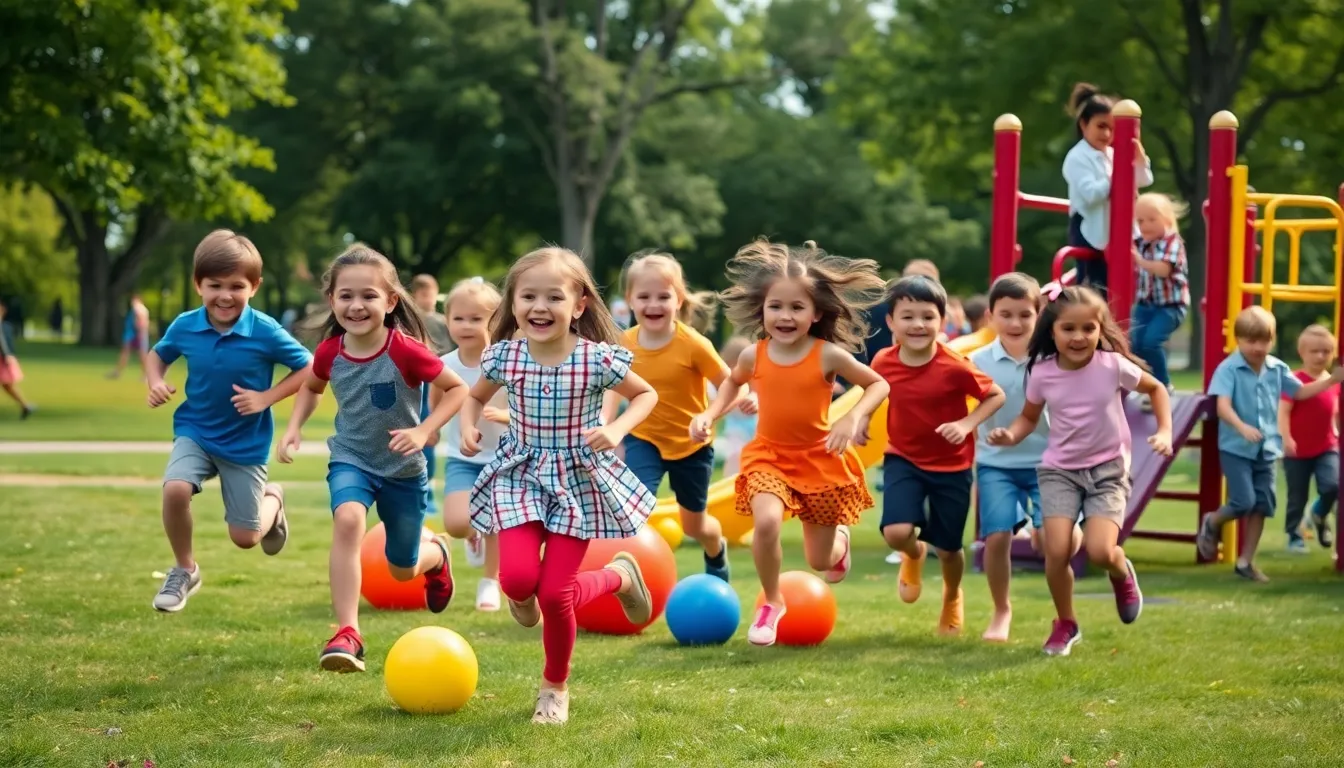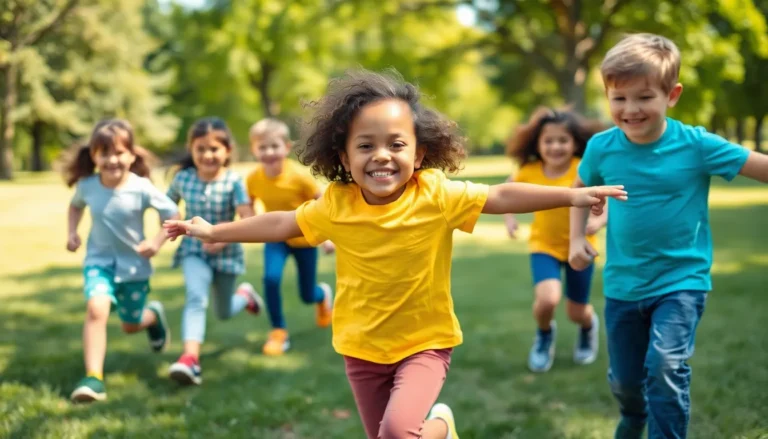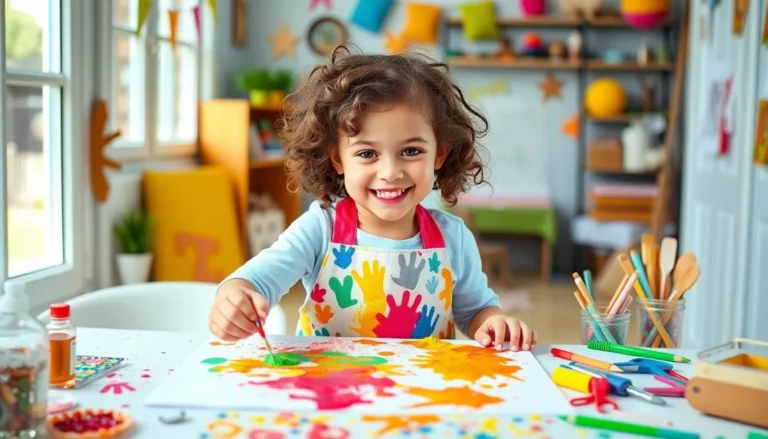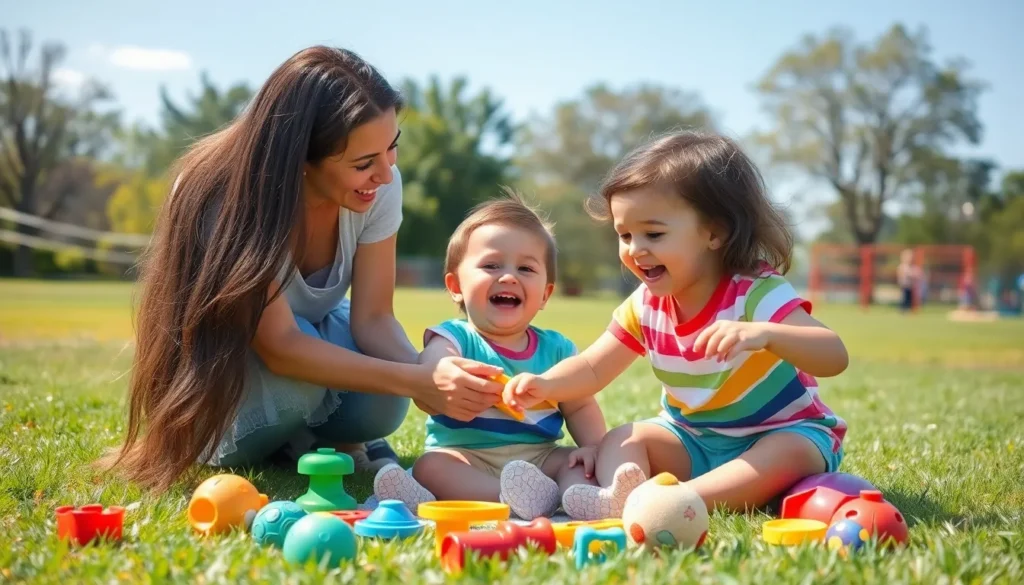Table of Contents
ToggleRaising a child can feel like a rollercoaster ride—full of ups, downs, and unexpected twists. As parents navigate this wild journey, they often find themselves asking, “Am I doing this right?” The good news is that child development doesn’t have to be a guessing game. With the right tips and tricks, they can turn parenting into a delightful adventure rather than a chaotic circus act.
Tips For Child Development: An Overview
Child development requires intentional strategies that support growth in various domains. Fostering a nurturing environment lays a strong foundation for emotional and cognitive development. Stimulating activities promote fine and gross motor skills, enhancing coordination and physical fitness.
Social interactions play a critical role in development. Encourage playdates and group activities, allowing children to learn cooperation and communication. Reading together enhances language skills and vocabulary, building a love for literature.
Structured routines contribute significantly to children’s sense of security. Predictable schedules help them understand expectations and develop self-discipline. Providing consistent boundaries aids in developing respect for rules and authority.
Encouraging exploration and creativity fosters independence. Hands-on activities like arts and crafts promote critical thinking and problem-solving skills. Introducing varied experiences, such as trips to museums or nature hikes, expands their understanding of the world.
Parental involvement remains crucial in supporting academic achievement. Engaging in school activities and establishing a homework routine reinforces the importance of education. Open communication cultivates trust, allowing children to express their thoughts and feelings.
Providing positive reinforcement boosts self-esteem. Celebrating achievements, no matter how small, strengthens motivation and encourages persistence. Maintaining a balance between praise and constructive feedback supports resilience and a growth mindset.
Investing time and energy into a child’s development reaps long-lasting benefits in their future. Prioritizing these strategies shapes well-rounded individuals ready to navigate life’s challenges.
Physical Development Tips

Physical development plays a crucial role in a child’s overall growth. Fostering activities that promote movement helps children build essential motor skills.
Encouraging Active Play
Active play is vital for developing coordination and strength. Engaging children in outdoor activities, like running, jumping, and climbing, enhances their physical capabilities. Structured games and unstructured free play both contribute to fitness, confidence, and social skills. Parents can bring friends together for playdates or enroll kids in sports to motivate participation. Providing access to a variety of equipment, such as balls and climbing structures, encourages exploration and creativity. These opportunities expose children to different environments, boosting problem-solving skills.
Importance of Nutrition
Nutrition significantly impacts a child’s physical development. Consuming a balanced diet full of fruits, vegetables, whole grains, and proteins supports growth and energy levels. Parents should prioritize serving nutrient-dense meals instead of processed options. Regularly including healthy snacks helps maintain energy and focus throughout the day. Educating children about healthy choices fosters lifelong habits. Involving them in meal preparation can spark interest and reinforce positive attitudes toward nutrition. Understanding the connection between nutrition and physical well-being empowers children to make informed choices.
Cognitive Development Tips
Cognitive development is essential for a child’s growth. Parents can actively nurture this aspect by implementing targeted strategies.
Stimulating Curiosity
Encourage exploration by providing diverse learning materials. Hands-on activities promote discovery and help children understand their environment. Offering open-ended questions lets kids think critically. Allowing them to experiment fosters creativity and problem-solving skills. Incorporate nature walks to observe plants and animals, sparking curiosity in their surroundings. Engaging in simple science experiments creates excitement around learning. Providing them with age-appropriate puzzles enhances their cognitive abilities. Involving kids in cooking promotes skills like measurement and sequencing. Infusing these activities with fun keeps their interest alive while supporting development.
Reading and Language Skills
Reading together strengthens language comprehension and vocabulary. Set aside daily reading time to build a love for books. Choosing varied genres exposes children to different writing styles. Discussing stories encourages expression and enhances critical thinking. Practicing phonics through games bolsters reading skills. Using audiobooks can engage auditory learners effectively. Engaging with educational apps dedicated to reading further enriches their experience. Incorporating rhymes and songs helps with language rhythm and memory. Parents can also model effective storytelling, igniting children’s interest in narrative development. Prioritizing reading fosters a solid foundation for future academic success.
Social and Emotional Development Tips
Developing social and emotional skills significantly impacts a child’s overall growth. Parents can actively foster these skills through intentional practices.
Fostering Relationships
Building positive relationships enhances a child’s social development. Encourage interactions with peers through playdates, group activities, or team sports. Monitoring these interactions helps guide appropriate responses to various social situations. Modeling healthy relationships provides children with examples to emulate. Encouragement in forming friendships promotes empathy and understanding. Observing social cues teaches children how to effectively communicate and express themselves. Engaging in family activities fosters strong bonds, creating a secure base for emotional growth.
Building Emotional Intelligence
Strengthening emotional intelligence equips children to navigate their feelings. Discussing emotions openly helps kids understand their own feelings and those of others. Parents can model emotional regulation by expressing their feelings calmly and constructively. Encouragement to label emotions promotes vocabulary growth. Implementing problem-solving strategies teaches children to manage conflicts. Role-playing different emotional scenarios fosters perspective-taking skills. Viewing different situations from various angles enhances empathy and compassion in interactions.
Creative Development Tips
Creative development plays a vital role in a child’s growth. Engaging in imaginative activities offers children the opportunity to explore their creativity and express themselves.
Encouraging Imaginative Play
Imaginative play supports cognitive and social skills. Encourage children to create their own stories through role-playing, using props or costumes. Provide blocks, dolls, or action figures to inspire creative scenarios. Outdoor spaces become an extension of fantasy worlds. Limitations on toys should be minimal to allow free play. Parents can also participate, adding depth to the child’s experience. Observing how children interact with their environment reveals their thought processes. Through imaginative play, they develop problem-solving skills and learn to cooperate with others.
The Role of Arts and Crafts
Arts and crafts activities promote fine motor skills and creativity. Introducing various materials lets children express personal artistic styles. Consider using items like clay, paints, or recycled materials for diverse projects. Set aside specific times for crafting, emphasizing the importance of creative expression. Collaborate on projects that explore themes and ideas to enrich their understanding. Establishing an art corner at home encourages ongoing engagement. Sharing finished creations builds confidence and provides a sense of accomplishment. Such activities not only foster creativity but also enhance visual-spatial skills.
Parenting is a journey filled with unique challenges and joys. By embracing intentional strategies and nurturing environments, parents can significantly influence their child’s development. Engaging in activities that promote physical, cognitive, social, and creative growth lays a strong foundation for future success.
Fostering healthy habits and encouraging exploration not only enhances skills but also strengthens the parent-child bond. Providing support and guidance while allowing for independence prepares children to navigate life’s complexities with confidence. Through dedication and love, parents can help shape well-rounded individuals ready to thrive in an ever-changing world.







